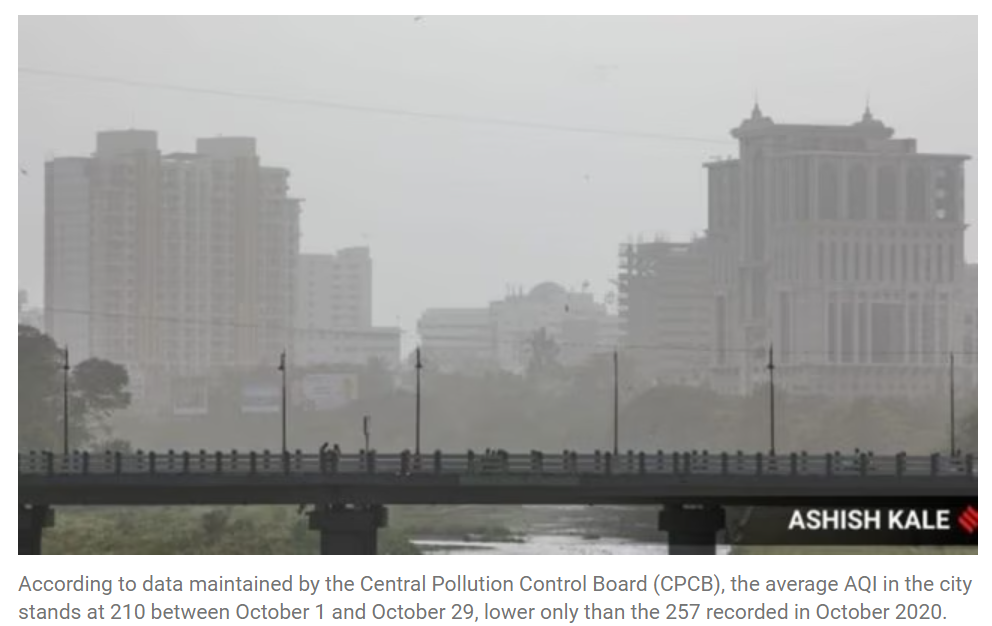While the reasons behind Delhi being among the most polluted capital cities in the world are a complex mix of geography, vehicular destiny, dust and farm fires, weather plays a vital role too.
The number of farm fires in Punjab may have seen a sharp dip this year, but Delhi’s air is the most polluted it has been since 2020.
According to data maintained by the Central Pollution Control Board (CPCB), the average AQI in the city stands at 210 between October 1 and October 29, lower only than the 257 recorded in October 2020.
So, if the input of pollutants is lower, why is Delhi breathing in more toxic air? The answer lies in rain.
In October 2022, when the average AQI was 198, the city saw 6 rainy days. In 2021, when Delhi saw its best October air since records have been maintained, with an average AQI of 166, the city saw 7 rainy days.
While the reasons behind Delhi being among the most polluted capital cities in the world are a complex mix of geography, vehicular destiny, dust and farm fires, weather plays a vital role too.
The primary pollutant in Delhi after monsoon rains is particulate matter (PM 2.5 and PM 10).
These particles can be blown away by strong winds and can be washed away by rains.
This is what happened in 2021 and 2022, with both years seeing over 120 mm of rain in the month. In 2020, the city saw only trace rains on a single day. This year, 5.4 mm rains were recorded on October 17, but the skies have been clear since.
The morning temperature has also been dipping over the past few says. On Sunday, the minimum was recorded as 16.3 degrees Celsius, normal for this time of the year.
It had fallen to 14.3 degrees Celsius, the lowest of the season so far, on Saturday.
The maximum temperature on Sunday was recorded as 33.4 degrees Celsius, two degrees above normal.
“Delhi had a spot of good luck during the third week after the rains were followed by strong winds, but over the past week, there has been no rain and the winds have been mostly calm. As a result, the pollutants have been accumulating. The problem is compounded by dipping temperatures as the area for dispersion of pollutants decreases further. As of now, there is no chance of rain in the coming week and the concentration of pollutants is expected to go up,” said a senior IMD official.
There may be some bad news in store. According to officials in the Punjab Pollution Control Board, the harvest of paddy is not over and the number of fires could go up in the coming two-three days.
“This year, since the festivals are later than usual, the harvest is also a little delayed. This means that there are many farms where the crop is still standing and they may be set on fire in the coming days as the time to sow wheat is nearing,” the official said.
Only buses with clean fuel in Delhi
Starting Wednesday, only electric, CNG and BS-VI compliant buses can enter Delhi from other states.
Environment Minister Gopal Rai on Sunday conducted a surprise inspection of Kashmere Gate ISBT. “At present, pollution generated from vehicles is increasing. All buses in Delhi are running on CNG. More than 800 electric buses are also running in Delhi. However due to BS-III and BS-IV diesel buses running in UP, Haryana, Rajasthan NCR area, pollution is increasing in Delhi. During the inspection at ISBT, it was found that all the buses that have come here from UP and Haryana are BS-III and BS-IV buses. None of the buses that have come from there are electric and CNG. That is why we demand that the Centre implement a complete ban on BS III and BS IV buses operating in NCR areas of Haryana, Uttar Pradesh and Rajasthan,” Rai said.
From November 1, a campaign will be conducted by the Transport Department at all entry points to check the buses entering the city and action will be taken against any buses that do not follow the rules.
Article Credit: Indian Express
